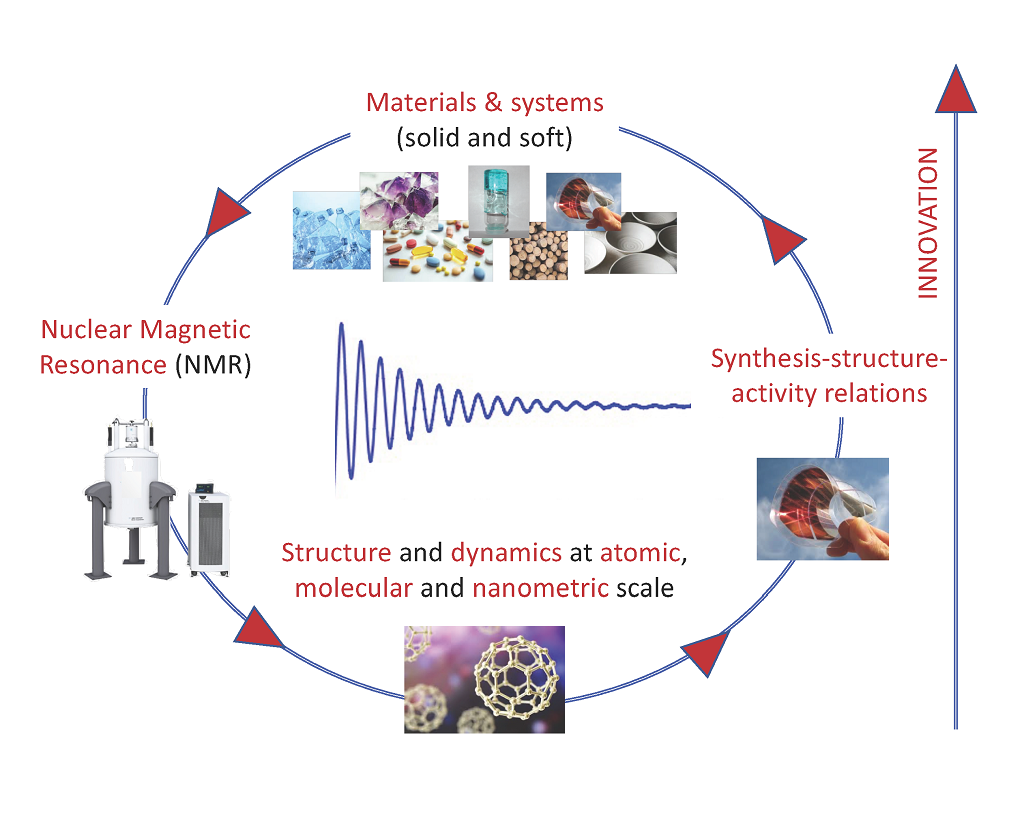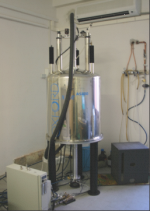Magnetic Resonance Spectroscopy Laboratory (MaRS-Lab)
 MaRS-Lab is a research laboratory located at the CNR-ICCOM secondary office in Pisa. It is dedicated to the study of solid and soft systems and materials by means of advanced Magnetic Resonance techniques.
MaRS-Lab is a research laboratory located at the CNR-ICCOM secondary office in Pisa. It is dedicated to the study of solid and soft systems and materials by means of advanced Magnetic Resonance techniques.
The main activity of the group is focused on the set-up and application of the most modern techniques of Nuclear Magnetic Resonance (NMR) spectroscopy and relaxometry which, through appropriate processes and interpretative models, allow the characterization of the most relevant structural and dynamic properties, on wide spatial (0.1-100 nm) and time (10-12 -1 s) scales, of materials and systems designed for the most diverse applications. The versatility of Solid State NMR techniques allows the study of organic, inorganic and composite materials and systems, small molecules or macromolecules, crystalline, semi-crystalline or amorphous samples, in practically any physical form, exploiting the many non-zero spin nuclei of the Periodic Table and the many NMR observables. The information obtainable (i.e., chemical structure, chemical and physical interactions, degree of mixing of different components, mobility at the molecular and supramolecular level, etc.) allow an in-depth characterization of the examined systems, which is fundamental for understanding the performance, synthetic processes, transformations, etc.
Within the laboratory there are also skills in electron paramagnetic resonance spectroscopy (EPR). The researchers of the group work in collaboration with many Italian and foreign research groups in the context of national and international research projects, and are also involved in industrial R&D projects.
The laboratory is equipped with modern and diverse instrumentation for Solid State NMR spectroscopy and relaxometry, which allows effective multinuclear and multiscale studies to be carried out. Thanks to the close collaboration with colleagues of the Department of Chemistry and Industrial Chemistry of the University of Pisa (DCCI-UNIPI) and to the participation in CISUP (Center for Integration of Scientific Instrumentation UNIPI), the researchers of the group also have access to the NMR instrumentation located at DCCI-UNIPI.

Areas of application
NMR studies on:
- Materials and processes for the energy transition and climate change mitigation: renewable energies (inorganic and organic photovoltaics), CO2-capture, thermochemical materials, eco-sustainable cements;
- Materials and processes for the circular economy: recycling and valorization of biomass and urban waste, innovative biochar for soil treatment;
- Latest generation inorganic materials and organic-inorganic hybrids (phosphorene, MOF, perovskites, etc.);
- Polymeric and composite materials of interest for new technologies;
- Drugs (active ingredients, excipients, formulations) and materials for biomedical applications (contrast agents for MRI, hydrogels for drug delivery and tissue engineering);
- Molecular materials (liquid and plastic crystals, ionic liquids, etc.).
- Advanced adsorbent materials (SAPO, MOF, composite sorbents) for heat storage and adsorption heat pumps – in collaboration with Angelo Freni, CNR-ICCOM Research Director.
Instruments
 Bruker Avance NEO 500 spectrometer (500 MHz 1H Larmor frequency) equipped with 4 CP-MAS double / triple resonance probes for solids (rotor diameters 1.3 mm, 2.5 mm, 3.2 mm, 4.0 mm), including a fast-MAS probe (70 kHz), a probe for low-γ nuclei and one for semi-solids (HR-MAS), capable of operating between -50 ° C and 80 ° C (@ CISUP / DCCI UNIPI);
Bruker Avance NEO 500 spectrometer (500 MHz 1H Larmor frequency) equipped with 4 CP-MAS double / triple resonance probes for solids (rotor diameters 1.3 mm, 2.5 mm, 3.2 mm, 4.0 mm), including a fast-MAS probe (70 kHz), a probe for low-γ nuclei and one for semi-solids (HR-MAS), capable of operating between -50 ° C and 80 ° C (@ CISUP / DCCI UNIPI);- Varian InfinityPlus 400 spectrometer (400 MHz 1H Larmor frequency) equipped with 2 CP-MAS double resonance probes for solids (rotor diameters 3.2 mm and 7.5 mm) and 1 static goniometric probe (@ DCCI-UNIPI);
- Stelar Spinmaster FFC-2000 Fast Field-Cycling NMR relaxometer, operating at Larmor 1H frequency ranging from 0.01 to 40 MHz) in the temperature range between -140 ° C and 110 ° C (@CNR);
- Relaxometer consisting of a Niumag magnet (1H Larmor frequency of 20.7 MHz) interfaced with PCNMR console, capable of operating between -50 ° C and 90 ° C (@CNR);
- Varian E112 X-band EPR spectrometer equipped with CW accessories and pulsed ENDOR and LOMENDOR accessories (@CNR).
Permanent staff
- Silvia Borsacchi, Senior Researcher
- Lucia Calucci, Senior Researcher
- Elisa Carignani, Researcher
- Silvia Pizzanelli, Researcher
